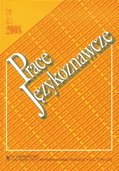Metaphorische Komposita mit den Komponenten ‘Asylant’ und ‘Flüchtling’ im deutschen medialen Flüchtlingsdiskurs
Metaphorical Compounds with ‘Asylant’ and ‘Flüchtling’ in Refugee-Related German Media Discourse
Author(s): Anna DargiewiczSubject(s): Applied Linguistics
Published by: Wydawnictwo Uniwersytetu Warmińsko-Mazurskiego w Olsztynie
Keywords: refugee discourse; metaphor; the linguistic worldview;context; nonce world; word formation
Summary/Abstract: The author stresses the fact that the time is anthropocentric: in the language and in the culture it is perceived through the prism of human life. Two ways of reading time in oikonyms are identified as the most important: the examination of proper names of settlements with components old and new, and the word building analysis, in which time correlates with the oikonym building model, which is characteristic of a specific period of the society development. In the research the author focuses her attention on the second of these ways. It has been noted that taking the oikonym building formant into consideration, we can single out oikonyms of the old Ukrainian (princely) period; names of the settlements of the old Ukrainian epoch (XIV−XVII centuries); oikonyms of the new Ukrainian time (late ХVІІІ–ХІХ centuries). In the names of the settlements of the postwar period of the XX century, which appeared as a result of renaming, and in the names of the settlements of the early XXI century with renovated former or assigned modern names, the suffix is not an indication of temporality. Extra lingual information contributes to time establishing of these names. It has been clarified that possessives with formants *-jь (*-j-а, *-j-е), -ів (<*-ovъ), -ин (<*-inъ); names-pluratives with formants -ичі (<*-іtj-i), -ани/ -яни (<*-any/*-jany), -івці (<*-оvьci), -инці (<*-inьci); oikonyms with formants -ськ /-цьк (<*-ьskъ), -н (<*-ьn), -ець (<*-ьcь), -иця (<*-ic-a) are the explicators of the ancient period of founding and naming settlements. At the same time the presence of the formant -івк-а, -к-а, -иха, -(щ)ин-а in an oikonym is an indication that the name of the settlement is new. It has been stressed that linguistic data can have a claim on objectivity only in combination with extra lingual (historical, cultural) information. New names could be formed by archaic pattern, so the suffix in them performed only a formal function and was a means of toponymisation. Single oikonyms with the latest formants appeared also in ancient documents, that is why it is inappropriate to categorically state the impossibility of founding such names in the Middle Ages or even earlier. It has been stated that modern oikonyms have undergone many modifications; suffixes were changed the most; that is why only the synchronous and diachronic analysis of onym enables the real-time vision of founding and naming a settlement. It has been proved that time as an important aspect of human consciousness, determined by the mother tongue and the national culture, leaves epoch colouring unique for each ethnos in the names of settlements.
Journal: Prace Językoznawcze
- Issue Year: 20/2018
- Issue No: 3
- Page Range: 19-42
- Page Count: 24
- Language: German

